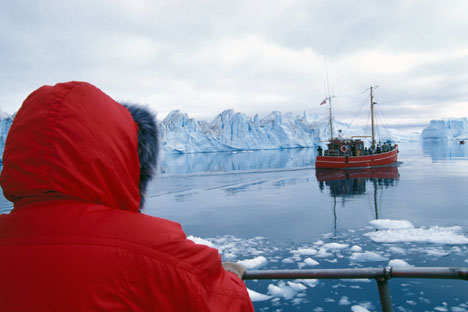
The Arctic: Risk and opportunity. Source: Getty Images / Photobank
The Arctic conference in Moscow, “The Arctic: Region of Development and Cooperation”, which was organized by the Russian International Affairs Council (RIAC) and the Russian Academy of Sciences' Institute of World Economy and International Relations (IMEMO) on Dec. 2-3, brought together politicians, diplomats, academics, businessmen and environmentalists from the U.S., Russia, Canada and Europe.
Since the conference presented a unique opportunity to address common challenges in the Arctic and foster cooperation between countries, the organizers of the conference as well as most of the participants were optimistic about the future of the Arctic.
“The Arctic region is a laboratory of new models for international collaboration that can be applied in other [less stable] regions,” said Andrey V. Kortunov, President of the New Eurasia Foundation and the General Director of the Russian International Affairs Council (RIAC).
Artur Chilingarov, the Russian President’s Special Envoy for International Cooperation in the Arctic and Antarctic, doesn’t see any reason for future confrontation in the Arctic. A large number of conferences dedicated to the Arctic indicate that there is growing interest in bringing stability to the region and more cooperation, according to him.
The Arctic conference in Moscow indicates that there are a lot of unresolved issues that “we need to negotiate,” Chilingarov told Russia Direct.
David Balton, Ambassador for Oceans and Fisheries at the U.S. Department of State, echoes his Russian counterparts.
“I see the United States and Russia as continuing to collaborate in the Arctic for the foreseeable future because the interests of both of our nations overlap very significantly: We both want a stable and peaceful Arctic that can develop and also where we can protect the environment. So, there are no major policy differences between the U.S. and Russia or the other Arctic states.”
The militarization of the Arctic: myth or reality?
The Arctic is not only an opportunity but also a high-stakes risk that requires prudence and vigilance, according to Leonid Kalashnikov, First Deputy Head at the Committee on International Affairs of Russia’s State Duma. He warns against future escalation in the region.
“Everybody is saying that we will prevent the militarization of the Arctic, yet we forget that an active NATO member, Norway, has a strong presence in the region,” he told Russia Direct. “When NATO seeks to expand its participation in the Arctic and other countries seem to regard these ambitions peacefully enough, I feel not only embarrassed, but also indignant. Despite optimistic statements that there will be no any militarization of the Arctic, we should remain prudent.”
Foreign experts and diplomats look at the problem from different angles. Scott Highleyman, Director of the International Arctic Program at the Pew Charitable Trusts, warns against “the risk of not collaborating.”
“[If] we don’t learn from each other, one country will make the same mistake and the next country will make the same mistakes,” he told Russia Direct. “So, the biggest risk on not cooperating is that we may miss an opportunity to figure out this issue, how to live in the Arctic sustainably and how to build a normal economy while protecting the environment.”
Alfred Jakobsen, Executive Director at Inuit Circumpolar Council (Greenland), assumes that “unilateral, individual economic interests, and some sovereignty issues” may be an impediment for multilateral collaboration in the Arctic and calls for a more transparent joint approach that could foster “a lot better collaboration.”
David Benton, Commissioner at the U.S. Arctic Research Commission, believes that “the biggest impediment to further collaboration in the Arctic is complacency that people in whatever country decide that there are not any problems and everything is going to be fine.”
“I do believe that right at this time all the Arctic countries together have the unique opportunity in history to build institutional arrangements and mechanisms for cooperation that would extend for decades. And a way to do that is talk well to each other and to listen, talk more and look for common concerns and common interests.”
Will the U.S. ratify the UN Law of the Sea Convention? Will NATO increase its military presence in Arctic? How the militarization of the Arctic can affect Russia-US relations? Read more opinions from experts in the full article published at Russia Direct
Russia Direct is international analytical media outlet with the focus on foreign policy. Its premium services, such as monthly analytical memos and quarterly white papers, are free but available for subscribers only. For more information about the subscription, please visit russia-direct.org/subscribe.
All rights reserved by Rossiyskaya Gazeta.
Subscribe
to our newsletter!
Get the week's best stories straight to your inbox